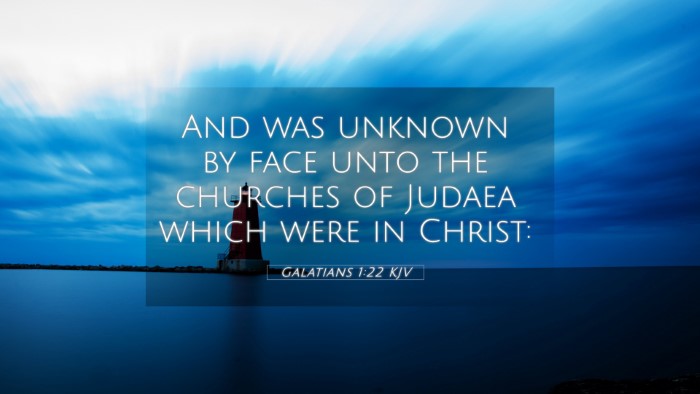Understanding Galatians 1:22
Verse: Galatians 1:22 - "And was unknown by face unto the churches of Judaea which were in Christ."
This verse reflects the Apostle Paul's situation as he describes his ministry and connections, particularly with the churches in Judea. Following his dramatic conversion, Paul had a unique path that led him to become a key figure in the early church. However, upon his initial arrival to Jerusalem, he discovered that he was relatively unknown among the followers in Judea, a point that plays a significant role in his argument and credibility amongst these congregations.
Key Themes in Galatians 1:22
- Identity in Christ: This phrase suggests that true recognition comes not from reputation, but from spiritual fellowship in Christ.
- Transformation and Acceptance: Paul’s unknown status reflects the transformative power of Christ that can change a person's life and purpose.
- The Role of Community: The churches in Judea illustrate the communal aspect of faith and how individual experiences contribute to a collective identity in Christ.
- Apostolic Authority: Paul’s unknown presence emphasizes his struggle for acceptance and affirmation in a ministry that constantly questioned his authority.
- Connection Through Faith: Recognition within the Church does not primarily hinge on physical familiarity but on shared beliefs and faith.
Theological Insights
Commentaries by scholars such as Matthew Henry, Albert Barnes, and Adam Clarke provide depth to the understanding of this verse:
-
Matthew Henry: Highlights Paul's previous life as a persecutor of Christians and juxtaposes it with his transformation, indicating the radical change that occurs through divine intervention. He emphasizes that the churches' unfamiliarity is a testament to the profound nature of God's call.
-
Albert Barnes: Notes the significance of 'unknown by face', suggesting that despite Paul's lack of physical presence in these communities prior to his ministry, his authority stems from his apostleship rather than personal connections. This challenges the early church's understanding of leadership.
-
Adam Clarke: Explores the context of Paul's ministry in Judea and suggests that this unfamiliarity is crucial for establishing the authenticity of his apostolic mission. He emphasizes how this lack of personal recognition does not detract from his salvific message.
Bible Verse Cross-References
This verse connects with several key biblical passages that deepen the understanding of Paul's role and the theme of unknown apostles. Notable cross-references include:
- Acts 9:26-27: Narrates Paul's initial introduction to the disciples in Jerusalem, reflecting their fear and disbelief towards him.
- 1 Corinthians 15:8-10: Discusses Paul's post-resurrection encounter with Jesus, highlighting his transformation and mission.
- Galatians 2:1-10: Elaborates on Paul’s continued efforts to gain acceptance from the apostles in Jerusalem.
- 2 Corinthians 5:17: States the fact of becoming a new creature in Christ, relevant to Paul’s transition from a persecutor to an apostle.
- Ephesians 3:8: Paul describes himself as the least of all saints yet entrusted with the gospel, showcasing his humble beginnings.
- Romans 1:16: Presents Paul’s understanding of the gospel's power, essential in his acceptance in churches.
- Philippians 3:5-6: Paul recounts his former life as a Jew, underscoring the great change in his identity and mission.
Connections Between Bible Verses
When analyzing Galatians 1:22, it is important to consider its thematic connections with other scriptures, which highlight the transformative power of faith:
- John 1:12: "But as many as received Him, to them He gave the right to become children of God." This affirms the identity established through faith irrespective of past identities.
- 2 Timothy 1:12: Paul mentions that he suffers for the gospel, yet he remains convinced of its truth and his calling.
- Colossians 1:13-14: Speaks of redemption and transfer into the kingdom of God's Son, echoing Paul's own experience.
- Luke 19:10: Underscores Christ's mission to seek and save the lost, which resonates with Paul’s conversion narrative.
Conclusion
Galatians 1:22 serves not only as a statement of Paul's relationship with the early Judean churches but also encapsulates broader themes of identity, transformation, community, and faith. Through respected commentaries and cross-referenced verses, it becomes clear that Paul’s unknown status among these early believers speaks volumes about the nature of his transformative encounter with Christ and the powerful work of God in calling individuals to ministry.









